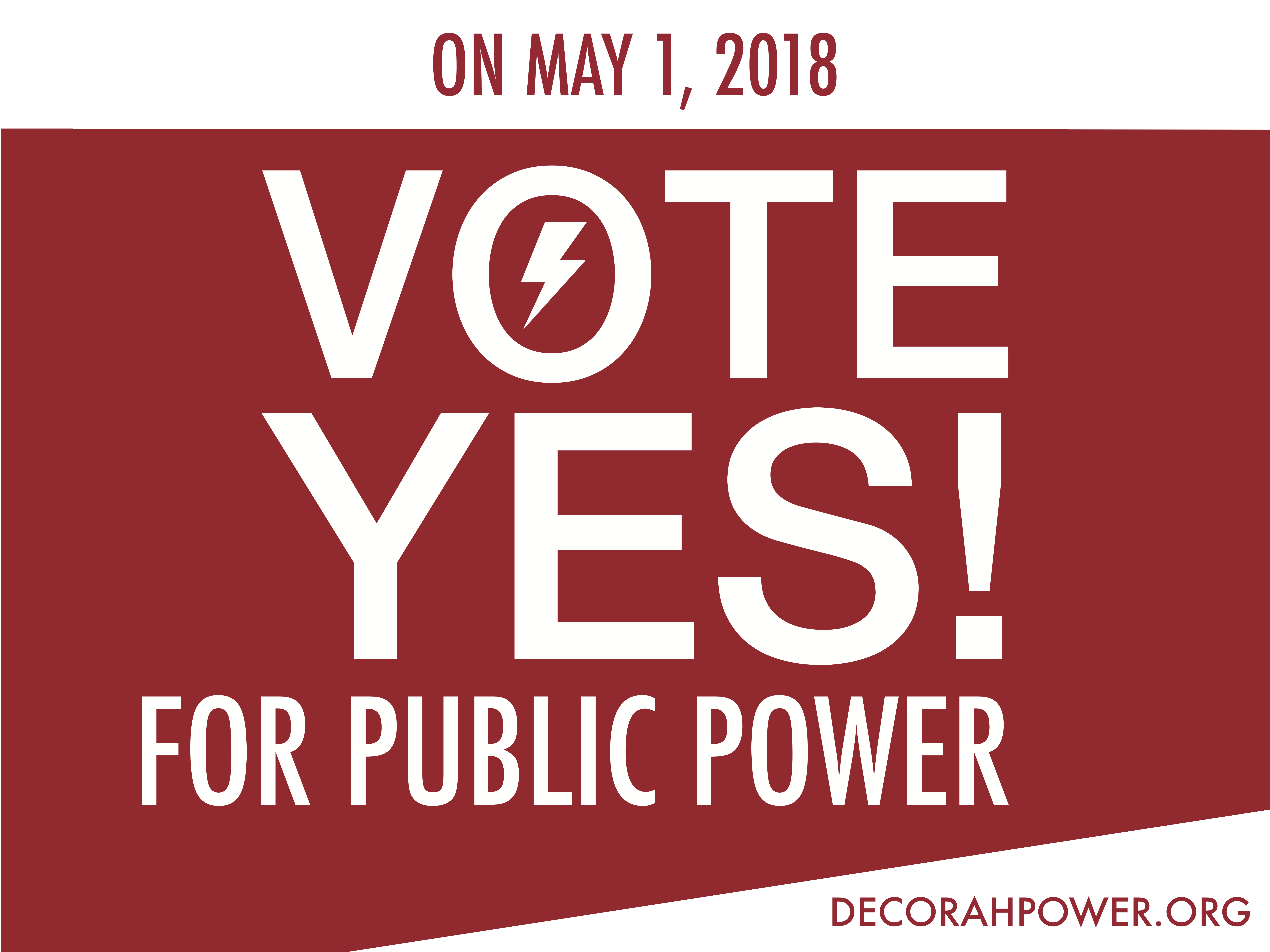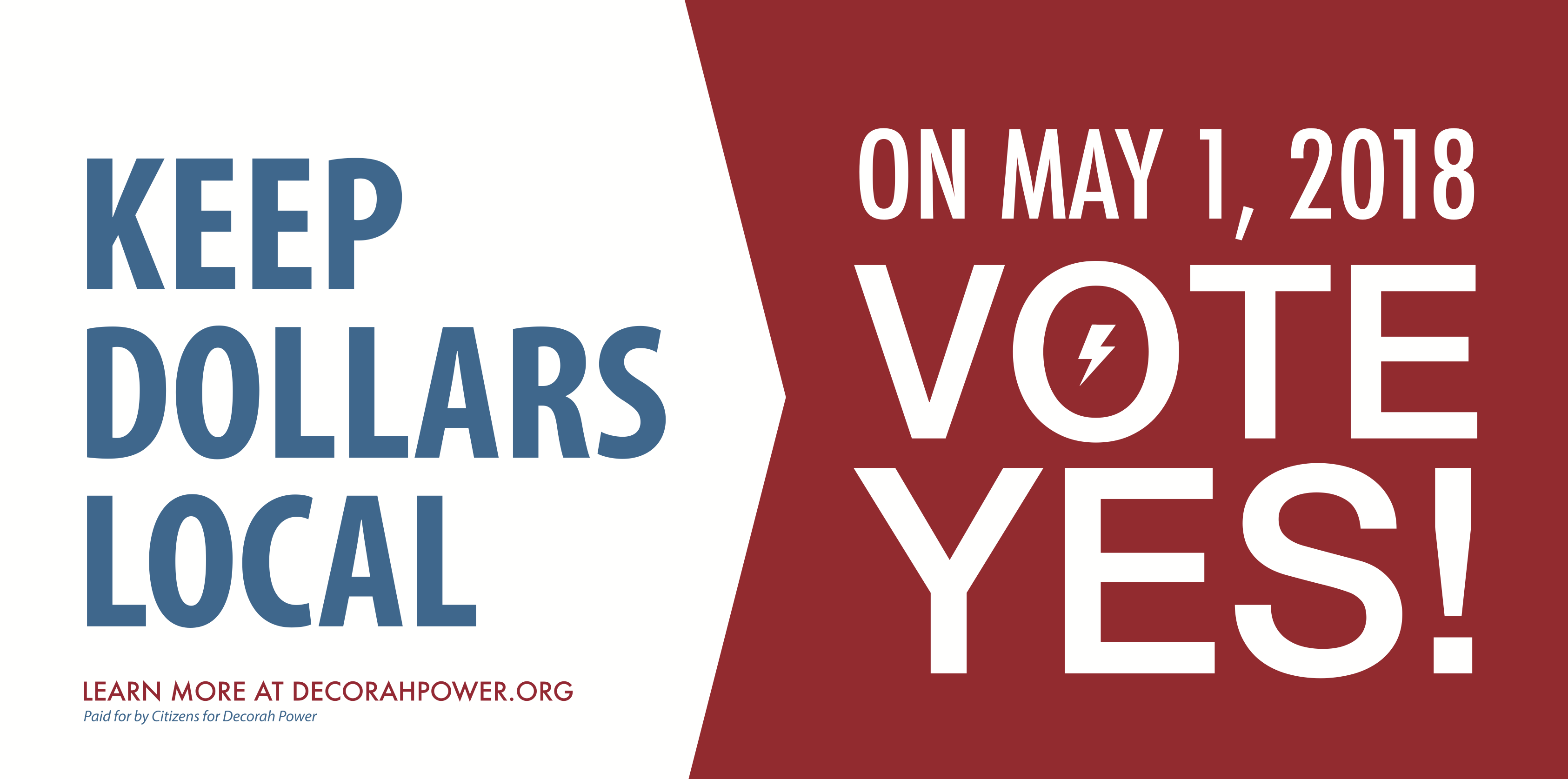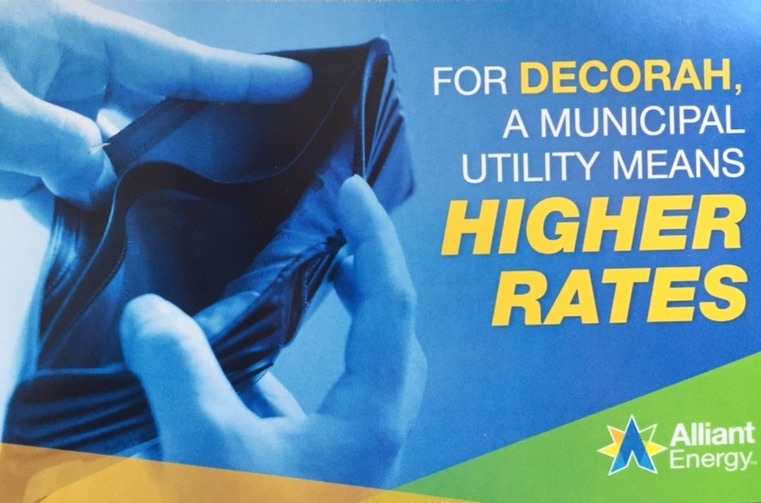Community organizer Tabita Green provides a fascinating inside view of a hard-fought local referendum. -promoted by desmoinesdem
In a northeast Iowa town known for its Norwegian heritage, eagles, and beer, a grassroots effort to “topple Goliath” (aka Alliant Energy) almost succeeded—even in the face of extreme opposition from the corporate energy giant. A special election on May 1 to authorize the City of Decorah to establish a municipal electric utility (MEU) resulted in a three-vote win by the Alliant-funded “No” campaign. That is the good news.
I got involved with the group that would become Decorah Power in the fall of 2016. My personal motivation to join this eclectic group was twofold. First, I had hoped to establish a community-owned solar garden in Decorah to get my household energy from the sun rather than from Alliant’s fossil-fueled energy portfolio. However, after asking around about the possibilities, I learned that Alliant in 2015 had refused to cooperate with a “Shared Solar” project involving five large institutions in Winneshiek County. Municipalization could open the doors to community-owned energy generation—and my solar garden dream.
Second, I am interested in finding ways—locally and regionally—to transition to a new economy, in part based on Gar Alperovitz’s ideas around community wealth building. Municipal enterprise is one of the strategies of this movement.
Decorah Power
We officially formed Decorah Power, a 501(c)(4) organization, in early 2017 with a singular goal: to investigate the feasibility of a Decorah electric utility. Our group consisted of a dozen or so folks passionate about sustainability, resilient rural communities, and policy. On March 20, 2017, the Decorah City Council approved of our plans to raise funds to commission a feasibility study on behalf of the city and appointed a liaison to our board. We raised around $90,000 from individuals, local businesses, Luther College, and a U.S. Department of Agriculture grant.
Guided by municipal utility experts, we did a national search for a firm to conduct the feasibility study and selected NewGen Strategies and Solutions. While their experts worked on the feasibility study in the fall of 2017, we continued to educate the community on the possibilities via a learning series with guest speakers from around the country. We were cautiously optimistic in these forums, not knowing how the feasibility study would turn out.
We got the results last December. And they were promising! According to the NewGen study, our community could save $5 million annually with a municipal electric utility. We could also have 30 percent renewable energy out of the gate, and the city would benefit from payments in lieu of taxes from the utility. We were so excited to share this news with our community and the city council and move forward with a referendum to move to the next step in the process: an application to the Iowa Utilities Board.
But Alliant beat us to the punch.
Alliant Energy
Alliant’s marketing team had casually been advertising the company’s greatness in our community since we made our intentions clear in early 2017. Full page ads in the newspaper. A billboard on Highway 9. AdWords ads. Facebook ads. We’ve been your partner for 100 years, they said. We’re reliable, trusted, and local. But on January 8 (eight days before we were scheduled to present the NewGen study to the city council), Alliant regional leaders launched their assault on our local democratic process with a community meeting at the Carrie Lee Auditorium to help us (Decorah citizens) “understand municipalization.”
Alliant’s leaders had commissioned their own feasibility study, and their consultant presented the shocking results. It would cost around $50 million to start up a Decorah electric utility (the NewGen feasibility study said $7 million), and rates would go up 30 percent. When pressed about where these numbers came from, the consultant said they were “preliminary numbers,” so she couldn’t share any data. There were many more scare tactics and promises provided in that meeting, but those numbers fueled the “No” campaign.
When our consultant, Dave Berg, presented the NewGen study to the city council a week later, Alliant employees took up many seats and took furious notes. An ensuing press release from Alliant shaped the narrative for the duration of the campaign (that had not yet officially started). It made three key points:
• A municipal electric utility would “rely on out-of-town crews to maintain and service Decorah.” (Not true—even contracted utility would have a local crew. This was to instill fear related to reliability. “If there was a tornado there would be no immediate local response.”)
• Some people in the current service territory would not be able to vote in a city special election. (True, but that was a distraction to divide the community. Nobody voted to have Alliant as their provider… Classic divide and conquer strategy.)
• The Alliant-funded study put the buyout cost at over $50 million. And then a key sentence: “We don’t think it is reasonable to ask citizens to take on millions in new debt to pay for a utility system that Decorah residents have already paid for through their utility bills.” (The $50 million figure is an inflated number aimed to scare people. If you look at the study, the acquisition cost is actually “only” $20 million [slide 5]. The comment about debt is misleading, since citizens would not take on the debt—the MEU would.)
The Investor-Owned Utility Playbook
We should have seen this coming. According to the American Public Power Association (APPA), “[a] for-profit electric utility will take extreme measures to stop the formation of a new public power utility, even in very small communities.” APPA’s handbook, Public Power for Your Community, describes strategies ranging from concessions and sponsored studies to public relations attacks. Alliant leaders made good use of these strategies in Decorah. Alliant leaders also hired a “community liaison” to infiltrate the community and eventually run the “No” campaign. This young, hipster-looking liaison joined the Rotary Club and showed up to every public meeting related to Decorah Power. Early on, he even tried to attend one of our volunteer training sessions.
It was clear we were up against a giant—a giant corporation using its vast resources gained from our utility bill payments to dissuade our community from joining 136 Iowa communities who already enjoy the many benefits of public power.
Special Election Campaign
Alliant’s initial fear mongering didn’t deter us from moving on to the next phase, which was to gather a sufficient number of signatures in support of a referendum on May 1. Between mid-January and mid-February, we collected over 700 signatures. And on February 19, the Decorah City Council scheduled a referendum for May 1 with the ballot language, “Shall the City of Decorah, in the County of Winneshiek, State of Iowa, be authorized to establish a Municipally-owned electric utility?”
We formed a political action committee (PAC) called “Citizens for Decorah Power” and Alliant Energy did the same, opting for the name “Committee for Decorah’s Energy Future.” Unlike the “No” campaign, which was funded by our rates, our “Yes” campaign had to raise money for yard signs, brochures, advertising, etc. We held an auction in late February and also started a crowdfunding campaign to raise funds.
The “No” campaign soon became highly visible with an active Facebook page, yard signs, billboards, digital advertising, newspaper advertising, radio ads, and more. There isn’t room in the scope of this article to detail how we ran our campaign and how Alliant leaders conducted their campaign, but the short story is that we worked primarily with volunteers on a shoestring budget, always one step behind Alliant’s powerful campaign machine, and it was not easy. Because, how do you respond to a deceptive, fear-based campaign where facts and nuance don’t matter?
To illustrate, Alliant’s first postcard mailing showed an empty wallet and the words, “For Decorah, a municipal utility means higher rates.”
No nuance, no reasonable data or assumptions backing up the claims. We knew Alliant would campaign against us, but we were unprepared for the deceptive messaging. Our own messaging stuck to what we knew, adding caveats and non-committal language to ensure we weren’t making promises we couldn’t keep—or putting words in the mouth of a future local utility board. The “No” campaign made big, bold (unsupported) statements like “Vote no to $50 million in new debt” or “Vote no to double-digit rate hikes.” And people responded with anxiety and anti-change comments like, “if it ain’t broke, don’t fix it.” Alliant’s core supporters (primarily regional employees and their friends and family) even started a change.org petition to maintain the status quo!
We knew votes in this election would be based on relationships and emotions, so we tried as much as we could to get out in the community, talk to groups, host community forums, go door to door, call people, and attend house parties. Many people were receptive and appreciated our work. Others expressed concern about the city’s ability to handle a big project like this and the cost associated with applying to the Iowa Utilities Board. (The NewGen study conservatively estimated this at $1 million and noted that an MEU would repay this money to the city if the application was successful. If the application was not successful, the cost would be absorbed by taxpayers. This was the only risk we would have to take for the potential of saving up to $5 million a year and owning our energy future.)
Conspiracy Theories
Conspiracy theories flourished in letters to the editor and especially on Facebook. Decorah Power members are in this to get rich quick, was a story we heard throughout the campaign. (Nope!) Decorah Power has bought the city council, was another popular one. (Nope, again.) And my favorite: Luther professors are giving college credit to get students to vote yes. (Alliant supporters didn’t think it was fair that college students could vote in this election and actively tried to suppress the student vote with letters to the editor and absurd claims like the above.)
A citizens group trying to do what we thought was best for our community, Decorah Power was cast as a special interest group lobbying the city to get something in return. (Okay, a clean energy future, savings for our community, and energy independence.) Rather than viewing municipalization as a city effort, it turned into Decorah Power against Alliant Energy—and especially the local line workers, who work hard every day to keep our lights on. Alliant—the Big Corporation—got conflated with hardworking neighbors and friends.
Consequently, the Decorah Power movement was perceived by some as a personal attack on the seventeen Alliant employees serving Decorah (and a large region beyond our service territory). Alliant’s campaign stoked and capitalized on that perception. On election day, Alliant posted a picture of seven lineworkers posing in downtown Decorah with the caption, “Today is Election Day and our 17-member local crew appreciates your support. Please vote NO today to keep our local crew working for you!”
This “17-member local crew” was another key campaign message to sway the election results in favor of a “No” vote. Except, when an Alliant spokesperson was asked how many of these employees actually live in Decorah (not many), they deflected and said the company doesn’t track where its employees live. Yet somehow they were able to make claims about having “hundreds of employees and equipment, all within a two-hour drive.”
Let that sink in for a moment.
Election Day & Results
On election day morning, May 1, my friend and co-conspirator Emily Neal and I drove around town delivering May Day baskets made from recycled “Vote Yes” brochures and filled with popcorn and M&Ms. We strategically hung them on door handles of folks on our “get out the vote” lists—i.e. supporters who had not yet voted—as a friendly reminder to vote. Thus began one of the most exhilarating and emotionally exhausting days of my life. Many volunteers helped that day with everything from poll watching to making phone calls to driving folks to the polls. One of my friends, Liz Rog, hung out in front of the student union at Luther College reminding students to vote. We also had student volunteers—passionate about the cause—helping us get out the vote.
By 5 pm or so, some of us started to gather at our makeshift campaign headquarter, The Lingonberry, to continue calling supporters. We were still calling people 30 minutes before the polls were to close—and actually reached some voters who had forgotten all about the election. As someone who has never been involved in a political campaign before, I was struck by the importance of early voting for supporters (to get them off the list) and the sheer amount of person power and connections required successfully to get out the vote.
Around 8 pm, people who had supported our campaign in a variety of ways started to trickle in for a casual election results party. One of our board members, Carly Foster, left to go hang out at the Courthouse to await the results. She texted me the wards one by one as they finished counting—”Ward 1 is no,” she said. It was a huge gap (63 percent NO and 37 percent YES). I was concerned, but I knew this was the most conservative ward. Ward 3 was closer, but also a no.
We won the other three wards, but it wasn’t enough. At the end of the evening, we were down four votes. After the canvass the following week, when absentee votes had been counted, we were down five votes. We gathered signatures to call for a recount. Carly and two other community members volunteered to do the counting on May 11. Alliant sent six employees to watch. In the end, we lost 1,382 to 1,385. Three votes.
Three votes, despite being outspent five to one according to the first campaign financing disclosure reports, filed five days before the election. That doesn’t include the money spent during the year leading up to the official start of the political campaign. When I asked Alliant Vice President Terry Kouba how much money Alliant leadership planned to spend on their anti-municipalization effort at a community meeting on February 15, he replied smoothly, “We love our customers, and we’ll do whatever it takes to keep them.” He wasn’t lying—at least about the second part.
Many people, knowing of my involvement, have asked me how I feel after the election. I tell them I’m sad that we lost, but I’m mad about how we lost. Mad that even at the local level, we are not immune to the influence of corporate speech in what is supposed to be a democratic process—in this case speech by a regulated monopoly, using our money to convince us to vote against our own interests as a community.
The municipalization process in Iowa favors the powerful investor-owned utilities. It’s no surprise that the last successful municipalization case occurred in 1974, the year I was born. Cities have the right to municipalize, but the road is fraught with intense time commitment, legal fees, consulting fees, campaign costs, corporate speech, corporate bullying, and the challenge of communicating in an alternative-facts society. We also face the polarization and fear-based politics that have taken hold in our country since the last national election. Alliant leaders tapped in to this—and half of our voters chose to trust an out-of-state corporation more than their fellow community members.
But I am also hopeful. We almost won! Our community is more educated than ever about energy and the municipalization process. Half the voters in Decorah want to explore this opportunity further. Our city council is supportive. Luther College and many local businesses want to learn more. And a group of passionate people are eager to continue this work. I hope other Iowa communities will embark on the municipalization journey—we’ll be stronger together. Giant Alliant doesn’t have a monopoly on the divide and conquer strategy, so let’s get to work!
Tabita Green is an author, speaker, entrepreneur, and community organizer in Decorah. She believes humanity’s future health and happiness depends on the creation of resilient, sustainable communities and a new economy. Tabita is the co-founder of a worker cooperative, New Digital, and her blog inspires readers to take action for personal wellness, social justice, and a sustainable future. In her spare time, she likes to hike the bluffs, read, and teach Swedish.
Top image: Decorah, Iowa. Photo credit to Luther College.





1 Comment
Thank you so much for sharing this story...
…even though just reading about what Alliant did was a slimy experience. Please give us updates in the future about what is happening in Decorah.
PrairieFan Thu 31 May 10:25 PM